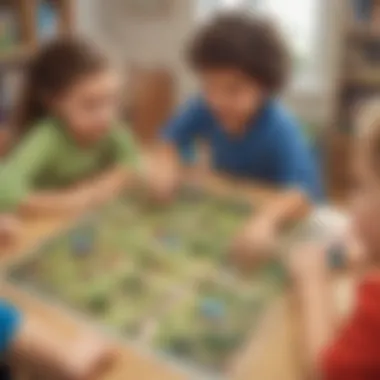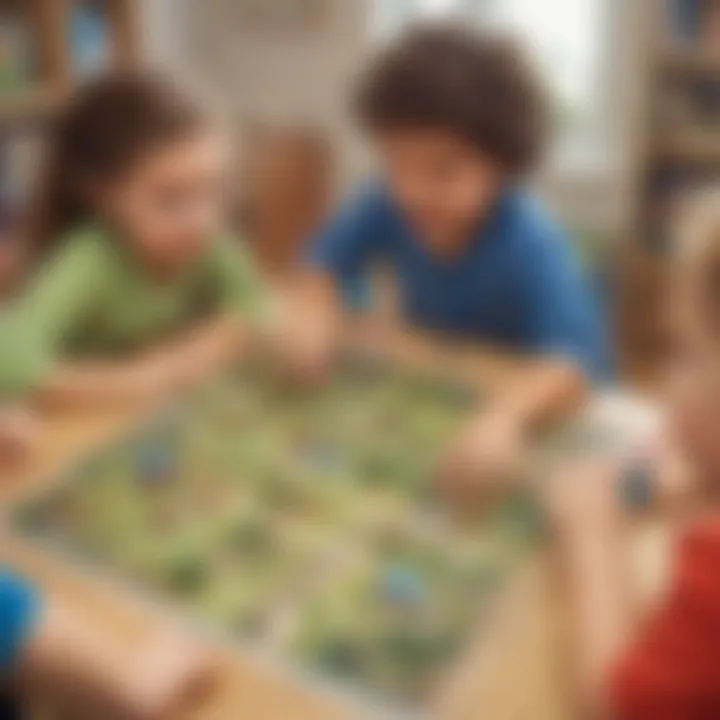Discovering Ideal Video Games for Preschoolers


Intro
In an increasingly digital world, video games have become a significant aspect of early childhood entertainment. Selecting video games for preschool-aged children requires careful consideration. This article delves into the most suitable games, highlighting their educational value, engagement levels, and developmental benefits. Parents and caregivers will find insights into how these games can enhance early learning while ensuring a safe and enjoyable experience for young players.
Creative Activities
Engaging in creative activities through video games can be highly beneficial for preschoolers. These games often integrate various craft ideas that encourage children's imagination and fine motor skills. Many platforms offer interactive crafting experiences, where children can design, create, and share their works with peers.
Craft Ideas
Some popular craft games allow children to replicate simple art and craft ideas, such as:
- Building unique characters using shapes and colors.
- Designing virtual environments that reflect their creativity.
- Participating in community events that showcase their creations.
Step-by-Step Guides
Many video games incorporate step-by-step guides that help children understand the crafting process. This method promotes independence and nurtures problem-solving skills. Games often outline tasks in easy-to-follow segments, ensuring kids don't feel overwhelmed. For example, a game might guide the child in coloring or assembling pieces by providing clear prompts.
Educational Value
The educational value of these creative activities is substantial. They not only promote artistic development but also support cognitive and emotional growth. By participating in these experiences, children learn about shapes, colors, and patterns. Furthermore, they enhance their ability to focus while practicing patience and resilience in the face of challenges.
Fun Quizzes
In addition to creative crafting, video games often include interactive quizzes designed for preschoolers. These quizzes serve to reinforce knowledge while making learning enjoyable. They cover various topics that stimulate curiosity and encourage exploration.
Quiz Topics
The topics included in quizzes for preschoolers may encompass:
- Animals and their habitats.
- Basic math concepts such as counting and simple addition.
- Language skills, including vocabulary building and phonetics.
Question Types
Engagement is crucial in quizzes. They typically feature a range of question types, including:
- Multiple-choice questions that simplify decision-making.
- True or false setups that encourage critical thinking.
- Fill-in-the-blank formats that enhance recall abilities.
Knowledge Reinforcement
Quizzes not only engage children, but they also reinforce learning effectively. By answering questions, kids gain confidence in their knowledge. They receive immediate feedback, which can spark curiosity and motivate them to learn more.
Fact-Based Articles
Preschoolers can also benefit from fact-based video games that present information in an engaging manner. These games often feature a wealth of knowledge across various subjects.
Topics
Some of the diverse topics covered include:
- Science and nature.
- Historical events suitable for young learners.
- Cultural insights and geography basics.
Engaging Content
The articles presented within these games aim to be both informative and easy to comprehend. They use simple language, illustrations, and interactive elements to keep children engaged while learning. This approach is vital in helping young ones grasp complex concepts without feeling intimidated.


Prelims to Video Gaming for Preschoolers
Video gaming for preschoolers is a subject that warrants careful consideration. At this stage of development, children are in a crucial phase where learning happens rapidly through play. Video games can act as a supplemental tool, encouraging both cognitive and social skills. While there are concerns about screen time, appropriate game selection can foster a positive learning environment.
The Role of Play in Early Development
Play is fundamental for preschoolers. It facilitates not just enjoyment, but also critical learning experiences. When children engage in play, they develop key skills such as problem solving, creativity, and communication. Video games can enhance this experience, creating interactive scenarios that challenge young minds.
For instance, games that require puzzle-solving can sharpen a child's analytical skills. This engagement helps children to think critically, a foundational element of learning.
Moreover, social play is also significant. Multiplayer games can encourage teamwork and collaboration. Building relationships through gaming can provide preschoolers opportunities to bond with peers, understanding concept of sharing, taking turns and resolving conflicts.
Understanding Educational Gaming
Educational gaming refers to video games designed with learning objectives as a core element. These games combine entertainment with educational content, allowing children to acquire knowledge while playing.
The essence of educational games lies in their ability to capture attention and motivate children. For example, games centered around basic math or reading skills are often enjoyable for young users while teaching essential concepts.
Parents often wonder about their effectiveness. Research supports the idea that well-structured educational games can reinforce learning at home. They are valuable tools, particularly in engaging law attention spans compared to traditional learning methods.
Criteria for Selecting Games
When it comes to choosing video games for preschoolers, the decision should not be taken lightly. The right games can foster growth and development while cultivating a love for learning. The criteria for selecting games focus on three main elements: age appropriateness, educational content, and engagement and interactivity. Each of these criteria plays a critical role in ensuring that the selected games are not only fun but also beneficial to a child's developing mind.
Age Appropriateness
Choosing games that fit the age of the child is essential. Preschoolers are typically aged three to five years old, and their cognitive abilities vary significantly within this range. Games designed for older children may pose challenges that can frustrate younger players. Furthermore, age-appropriate games often utilize content and themes that resonate with preschoolers, making them more relatable and easier to understand. Parents should look for clear labeling on game boxes, which usually indicates the recommended age group.
- It's important to inspect the rating given by organizations like the Entertainment Software Rating Board (ESRB). A rating of "E for Everyone" is usually suitable for preschoolers.
- Consider whether the game allows children to engage with manageable tasks and learn new skills at their own pace.
This way, children can enjoy gaming without becoming overwhelmed, ensuring a positive experience.
Educational Content
Educational value is a cornerstone in selecting suitable video games for preschoolers. The goal is to choose games that actively promote learning, whether it through numbers, letters, or basic problem-solving skills. Games that incorporate educational content should provide various learning outcomes, making them not just a source of entertainment but a learning tool.
- Look for games that promote foundational skills such as counting, vocabulary, and critical thinking.
- Programs highlighting early literacy, numbers, or colors can stimulate cognitive development while being playful.
Incorporating educational elements helps cultivate a child's curiosity and willingness to learn, providing a sound base for future education.
Engagement and Interactivity
Interactivity in games is vital for maintaining a preschooler's attention. While watching a screen can be passive, engaging games encourage active participation, which is more beneficial for young minds.
- Games that require input such as decisions or movement can enhance a child's focus and encourage them to think critically.
- Look for games with vibrant visuals, simple controls, and narrative elements that captivate children's imagination and interest.
"Engaged children are more likely to learn effectively and enjoy the learning process."
In summary, selecting video games for preschoolers should be a thoughtful process that considers age suitability, educational content, and interactive components. By focusing on these criteria, parents can ensure that their children enjoy quality gaming experiences that enrich their learning and development.
Top Video Games for Preschoolers
The selection of video games for preschoolers is a significant aspect of early education. It is not just about entertainment; the right games can foster learning, creativity, and problem-solving skills. Parents and caregivers may feel overwhelmed by the multitude of options available. Thus, understanding the features and benefits of various games becomes essential. This section covers different categories of games that are particularly suitable for preschoolers, emphasizing educational value and engagement.
Interactive Storybooks
Interactive storybooks engage children in storytelling while enhancing their cognitive and language skills. These games often immerse users in vibrant narratives, allowing them to make choices that affect the story's outcome. This element of choice not only makes reading more engaging but also promotes critical thinking in young minds. Such interactive mediums are a beneficial way to instill the love of reading in preschoolers.


Benefits of Storytelling
Storytelling has a unique function in a child's development. It is not merely a way to entertain; it fosters imagination and strengthens emotional intelligence. By engaging with characters and narratives, children learn to understand different perspectives. This attention to narrative structure helps improve vocabulary and comprehension skills. As a result, storytelling is seen as a valuable tool in gaming for preschool-aged children.
Popular Titles
Several interactive storybooks have gained popularity among preschoolers. Titles like Winnie the Pooh: The Honey Tree and Toca Life: World not only tell engaging stories but also encourage interaction with the environment. These games often feature intuitive controls and colorful graphics, making them appealing to young players. Their popularity among children reflects their effectiveness in combining fun and learning seamlessly.
Puzzle Games
Puzzle games represent another crucial category in early gaming. They present challenges that require children to think critically and solve problems. These games often involve simple shapes or numbers and can range from matching games to basic logic puzzles. Engaging in these activities boosts cognitive skills, enhancing memory, and reasoning abilities in preschoolers.
Cognitive Development Benefits
The cognitive benefits of puzzle games are numerous. They promote mental agility and help improve spatial awareness. As children manipulate pieces to form images or find solutions, they enhance their problem-solving skills. Such games encourage perseverance as children often learn to keep trying until they succeed, teaching them resilience in the process.
Examples of Puzzle Games
Examples of popular puzzle games include Thinkrolls and Busy Shapes. These games are designed with young learners in mind and allow for gradual increases in difficulty. Players face challenges appropriate for their age, ensuring engagement without frustration. This balance makes these games an excellent choice for introducing preschoolers to critical thinking.
Creative Building Games
Creative building games allow children to express themselves in ways that traditional play may not. They offer an open-ended experience where kids can create anything from houses to imaginary worlds. This freedom leads to exploration of ideas and concepts, making it a fun way to learn about structures and function.
Encouraging Creativity
Creativity is a vital skill in early childhood. These games allow preschoolers to design and build while also enhancing fine motor skills. The act of dragging, dropping, and assembling parts fosters coordination and focus. Encouraging creativity through gaming can lead to lifelong benefits in innovation and adaptability.
Notable Games in this Genre
Notable titles like LEGO Duplo World and Minecraft: Education Edition provide platforms for creativity. Players can build without limits, making their worlds as expansive as their imaginations. These games are visually appealing and encourage collaboration when played with peers. This social aspect is essential for younger players as it builds teamwork skills.
Educational Math Games
Educational math games combine learning with fun. They introduce foundational math concepts such as addition, subtraction, and shapes in engaging ways. By integrating core concepts into gameplay, children are more likely to absorb math skills naturally.
Foundational Math Skills
Early exposure to math through games helps children develop a comfortable attitude towards numbers. These games typically incorporate activities such as counting objects or solving basic addition problems. This method can make math less intimidating, promoting confidence in their abilities to learn.
Recommended Apps and Games
Apps like Endless Numbers and Todo Math provide structured learning experiences. They are designed with preschoolers in mind, offering age-appropriate challenges. The guided approach often helps maintain attention and make the learning process enjoyable.
Language and Vocabulary Games
Language and vocabulary games focus on enhancing communication skills for preschoolers. They introduce new words, pronunciation, and sentence structure in a playful setting. This engagement is critical at this stage when children are rapidly expanding their language skills.
Enhancing Language Skills
These types of games are vital for being an effective communicator. They often promote phonetics through fun activities that encourage repetition. By developing these abilities early, children enter school better prepared to engage in conversations and lessons.
Popular Language Games
Popular games such as Starfall and Endless Alphabet focus specifically on vocabulary acquisition. They provide interactive methods to learn words, often through rhymes or songs. The multisensory approach appeals to diverse learners, ensuring that all children can benefit.


In summary, the various categories of preschool games each offer significant advantages. By focusing on interactive experiences in storytelling, puzzles, creative construction, math, and language, parents can ensure they are selecting the most effective games for their children's developmental needs.
Safety Considerations
In the realm of childhood gaming, safety plays a paramount role. As preschoolers engage with video games, it is crucial to ensure their experiences are both secure and healthy. Focusing on safety considerations helps parents and caregivers create a conducive environment for learning and play. Understanding the aspects of screen time, parental controls, and safe gaming environments can significantly enhance the overall experience for young gamers.
Screen Time Guidelines
Setting appropriate screen time guidelines is essential for preschoolers. The American Academy of Pediatrics recommends that children ages two to five should have no more than one hour of high-quality programming each day. It is important for parents to monitor not only the quantity of time spent playing games, but also the quality of the games being played. Engaging content that is age-appropriate and educational should be prioritized to maximize the benefits of gaming while minimizing potential drawbacks.
In addition to limiting the time spent on screens, it is helpful for parents to engage in activities that do not include screens. Physical play, reading books, and family time are some excellent options. By creating a balance, parents can ensure their children experience a variety of developmental opportunities.
Parental Controls
Parental controls are an invaluable tool in managing how preschoolers interact with video games. Most gaming platforms, such as Nintendo Switch and PlayStation, offer built-in features that allow parents to set limits on play time, restrict access to certain games, and monitor in-game purchases. These controls empower parents to tailor gaming experiences to fit their child's needs and maturity level.
It also becomes crucial to communicate with preschoolers about boundaries. Explaining why certain games are not allowed creates an understanding between children and their caregivers. By being proactive with parental controls, caregivers can foster a safe gaming environment.
Safe Gaming Environments
Establishing a safe gaming environment is essential for preschoolers. This includes ensuring that gaming devices are placed in common areas of the home, rather than in isolated spaces like bedrooms. By doing so, parents can supervise gameplay and engage with their children during gaming sessions.
Moreover, it is important to encourage open dialogue about what children encounter during their playtime. Discussions about online interactions, appropriate content, and any discomfort experienced while gaming are vital for building a secure atmosphere.
"Creating a safe gaming environment not only protects children but also opens up opportunities for shared experiences that can enhance learning."
Parents should also be mindful of the types of games their children play. Researching games beforehand and referring to reviews can help parents make informed decisions, ensuring the titles chosen align with the desired developmental goals for their children.
Managing safety in preschool gaming is a multifaceted task. By focusing on screen time guidelines, utilizing parental controls, and setting up safe gaming environments, caregivers can nurture a positive gaming experience that benefits their child’s development.
The Impact of Video Games on Learning
Video games can often be seen as mere entertainment. However, for preschoolers, they serve a pivotal role beyond leisure. They can be valuable tools for cognitive and social development. Understanding how these games impact children’s learning journey is essential for parents and caregivers. This section highlights the positive effects video games have on preschoolers' learning and elaborates on two critical areas: cognitive benefits and social skills development.
Cognitive Benefits
Engaging with video games from a young age can enhance several cognitive functions. These games often challenge children to think critically and solve problems, which fosters their mental growth. Here are some key cognitive benefits:
- Problem-Solving Skills: Many video games present puzzles that require a strategy to overcome, allowing kids to develop critical thinking.
- Memory Enhancement: Games often use patterns and sequences that can help improve memory retention in young children.
- Attention Span: Interactive gameplay may encourage focus and concentration, training the brain to stay engaged with tasks for longer periods.
Moreover, research shows that video games can improve spatial awareness. Preschoolers learn to navigate through virtual environments, which can translate to better understanding in real-world contexts. For many children, this creative exploration stimulates curiosity and encourages a desire for learning.
"Children learn and explore in ways that are unique and engaging through video games, embracing the spirit of inquiry."
Social Skills Development
Social interaction is another element greatly enhanced by video games. These platforms provide opportunities for collaboration, encouraging children to work cooperatively or compete against each other. This aspect of gaming can facilitate numerous social skills:
- Teamwork: Many games require players to collaborate to achieve a common goal, teaching kids the importance of working together.
- Communication: Players often must share information and strategies, enhancing their verbal skills and promoting effective communication.
- Conflict Resolution: In competitive gaming scenarios, children learn to navigate victories and defeats. This can teach them to handle disagreement and learn resilience.
Ending
The exploration of video games for preschoolers is a vital topic for parents and caregivers. It offers insight into how interactive, educational tools can benefit children's development and learning. By selecting appropriate games, families can foster cognitive growth, creativity, and specific skills such as language and math.
Summary of Key Points
- Role of Play: Play is essential for early development. It allows children to engage with their environment and learn new concepts.
- Educational Value: Many video games are designed to enhance learning, incorporating educational content seamlessly into gameplay. They provide a dynamic way for children to acquire new knowledge.
- Engagement and Interactivity: Games that promote active participation are more effective. Engaged learners are more likely to retain information and develop skills.
- Safety Considerations: It is important to establish guidelines for screen time and use parental controls to ensure a safe gaming experience.
- Cognitive and Social Benefits: Video games can enhance cognitive skills such as problem-solving and decision-making while encouraging social interactions through cooperative gameplay.
Final Thoughts on Gaming for Preschoolers
When considering video games for preschoolers, parents must approach the selection process mindfully. The right games serve as valuable tools that support children's learning while ensuring they enjoy themselves. Educational games can bridge the gap between play and learning, providing a platform for young minds to explore and develop.
Ultimately, the key is to maintain balance. Video games should complement other forms of play and learning. Setting boundaries for screen time is essential and promotes a healthy relationship with technology. As caregivers navigate this landscape, they can confidently choose games that nurture their children’s growth and enjoyment.







